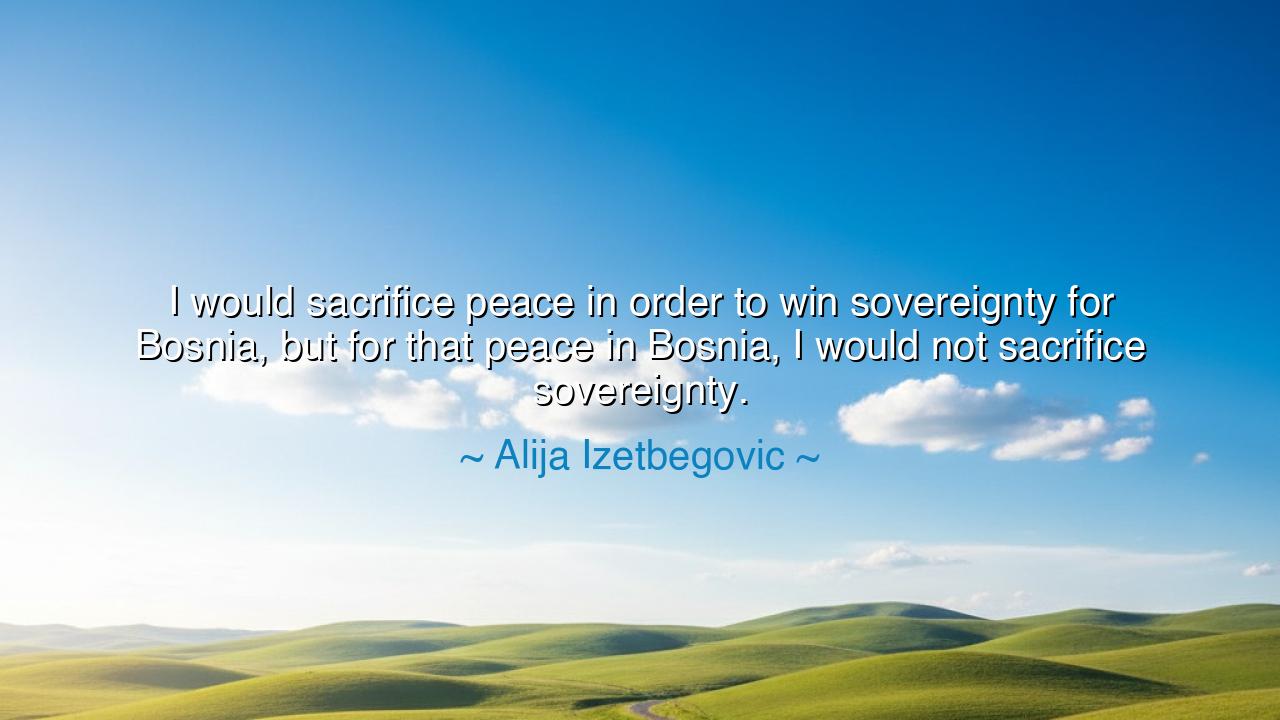
I would sacrifice peace in order to win sovereignty for Bosnia
I would sacrifice peace in order to win sovereignty for Bosnia, but for that peace in Bosnia, I would not sacrifice sovereignty.






Hear the fiery words of Alija Izetbegovi?, the first president of independent Bosnia, a man who guided his people through one of the most tragic storms of the twentieth century: “I would sacrifice peace in order to win sovereignty for Bosnia, but for that peace in Bosnia, I would not sacrifice sovereignty.” In these words there burns the eternal conflict between safety and freedom, between the quiet of submission and the struggle for independence. For what good is a fragile peace purchased with chains? And what worth is sovereignty if a nation is unwilling to fight to preserve it?
The meaning is deep and grave. Izetbegovi? declares that the life of a nation is more than the absence of war; it is the presence of dignity, freedom, and self-rule. He acknowledges that peace is precious, but not at any price. If peace requires surrendering the soul of a people, if it demands the loss of sovereignty, then it is no true peace but a mask of slavery. Better to endure hardship, even the suffering of conflict, if through that fire a nation may preserve its independence. For once sovereignty is lost, all else becomes uncertain—laws, culture, faith, and even memory itself can be rewritten by the conqueror’s hand.
The origin of this quote lies in the Bosnian War of the 1990s, when Bosnia and Herzegovina sought to break free from the crumbling Yugoslav state. Surrounded by hostility, its people endured sieges, massacres, and betrayals. Izetbegovi?, both a devout Muslim and a pragmatic statesman, held fast to the principle that Bosnia must be its own master. Offers of settlement and “peace” were often placed before him, but many required surrendering large portions of territory or accepting domination by outside powers. His refusal was not born of pride, but of the conviction that only sovereignty could ensure a lasting peace worthy of his people’s sacrifice.
History gives us many echoes of this same struggle. Consider Winston Churchill in 1940, when Britain stood alone against Hitler’s empire. Some urged him to negotiate, to secure a swift peace at the price of concessions. But Churchill declared he would never trade Britain’s sovereignty for the illusion of safety. He chose war rather than slavery, hardship rather than dishonor. And in time, his people prevailed, proving that freedom defended is stronger than peace surrendered. Izetbegovi?’s cry is of the same spirit: better to fight for liberty than to bow for ease.
Yet there is wisdom, too, in the second half of his words. While he would risk peace for sovereignty, he would not risk sovereignty for peace. This balance reveals his vision: that freedom is the foundation upon which true peace must be built. For peace without sovereignty is fragile and false, but sovereignty without peace is incomplete. The task of the wise leader is to secure both, but when forced to choose, he chooses sovereignty first—because only through it can lasting peace ever be born.
The lesson for us, children of future generations, is that freedom must never be sold cheaply. In our lives, too, we often face the choice between quiet submission and costly courage. Whether in nations or in hearts, sovereignty—the right to govern oneself, to live by truth, to stand in dignity—must always be guarded above comfort. Peace that demands the surrender of the soul is no peace at all. True reconciliation, whether among nations or among men, must be founded upon justice, dignity, and mutual respect.
Therefore, let your lives be guided by this teaching: cherish peace, but do not idolize it above sovereignty. When conflict comes, strive first for reconciliation, but not at the price of your dignity or your truth. Be willing to endure hardship if it means preserving freedom—for freedom is the soil from which real peace grows. And remember always that those who stand firm in defense of sovereignty leave behind not only safety for their people, but honor for generations yet unborn.
So hear the voice of Alija Izetbegovi?, echoing through the ruins of Sarajevo and into eternity: sacrifice peace for sovereignty if you must, but never sovereignty for peace. For peace without freedom is silence under chains, but freedom, though costly, can give rise to peace that endures.






AAdministratorAdministrator
Welcome, honored guests. Please leave a comment, we will respond soon